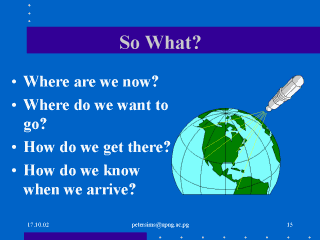| front |1 |2 |3 |4 |5 |6 |7 |8 |9 |10 |11 |12 |13 |14 |15 |16 |17 |review |
 |
Planning is a
continuous process and needs several skills - demography, epidemiology, statistics,
anthropology, economics, accountancy, management, ethics…..etc. Good planners have an
understanding of all these disciplines and appreciation of their use. They may need to use
experts but they have too to be pragmatic and principled. It is better to have a Plan than none for otherwise political expediency is the order of the day. Plans need to be adapted and adopted over time. It is the general direction of travel which is crucial for progress long term. Thus many plans are discarded or only partially implemented - that is natural. Planning must not be too tight nor mortgage the future too much for the needs of people alter, there are new diseases,new technologies, new constraints and opportunities. Disaster may come from a “clear blue sky”- 9/11/2001. The starting point for a plan is a problem, the problem can be determined and described in terms of key information.There are many constraints - the planner has to look for possible solutions not just in term s of yesterday but in terms of tomorrow. |